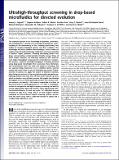Ultrahigh-throughput screening in drop-based microfluidics for directed evolution
Author(s)
Antipov, Eugene; Klibanov, Alexander M.; Agresti, Jeremy J.; Abate, Adam R.; Ahn, Keunho; Rowat, Amy C.; Baret, Jean-Christophe; Marquez, Manuel; Griffiths, Andrew D.; Weitz, David A.; ... Show more Show less
DownloadAgresti-2010-Ultrahigh-throughput.pdf (878.9Kb)
PUBLISHER_POLICY
Publisher Policy
Article is made available in accordance with the publisher's policy and may be subject to US copyright law. Please refer to the publisher's site for terms of use.
Terms of use
Metadata
Show full item recordAbstract
The explosive growth in our knowledge of genomes, proteomes, and metabolomes is driving ever-increasing fundamental understanding of the biochemistry of life, enabling qualitatively new studies of complex biological systems and their evolution. This knowledge also drives modern biotechnologies, such as molecular engineering and synthetic biology, which have enormous potential to address urgent problems, including developing potent new drugs and providing environmentally friendly energy. Many of these studies, however, are ultimately limited by their need for even-higher-throughput measurements of biochemical reactions. We present a general ultrahigh-throughput screening platform using drop-based microfluidics that overcomes these limitations and revolutionizes both the scale and speed of screening. We use aqueous drops dispersed in oil as picoliter-volume reaction vessels and screen them at rates of thousands per second. To demonstrate its power, we apply the system to directed evolution, identifying new mutants of the enzyme horseradish peroxidase exhibiting catalytic rates more than 10 times faster than their parent, which is already a very efficient enzyme. We exploit the ultrahigh throughput to use an initial purifying selection that removes inactive mutants; we identify ∼100 variants comparable in activity to the parent from an initial population of ∼10 [superscript 7]. After a second generation of mutagenesis and high-stringency screening, we identify several significantly improved mutants, some approaching diffusion-limited efficiency. In total, we screen ∼10 [superscript 8] individual enzyme reactions in only 10 h, using < 150 μL [mu L] of total reagent volume; compared to state-of-the-art robotic screening systems, we perform the entire assay with a 1,000-fold increase in speed and a 1-million-fold reduction in cost.
Date issued
2010-02Department
Massachusetts Institute of Technology. Department of Biological Engineering; Massachusetts Institute of Technology. Department of ChemistryJournal
Proceedings of the National Academy of Sciences of the United States of America. (PNAS)
Publisher
National Academy of Sciences (U.S.)
Citation
Agresti, J. J. et al. “Ultrahigh-throughput screening in drop-based microfluidics for directed evolution.” Proceedings of the National Academy of Sciences 107.9 (2010): 4004-4009. Copyright ©2011 by the National Academy of Sciences
Version: Final published version
ISSN
0027-8424
1091-6490